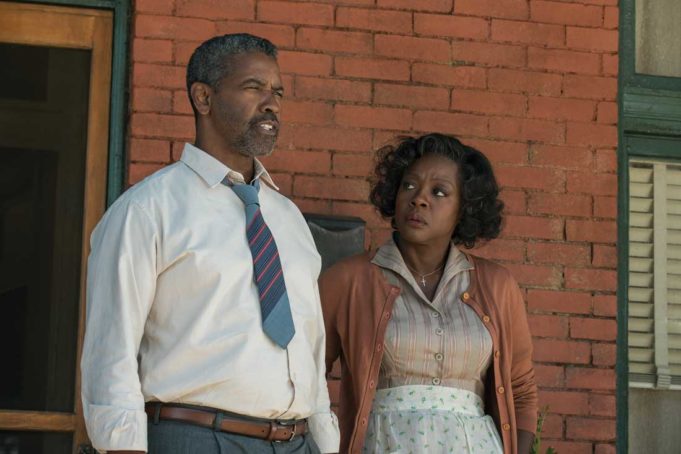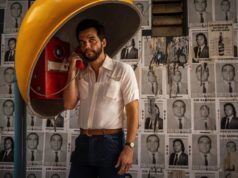While Denzel Washington has undoubtedly been one of the great actors of our time, his efforts as a director have been no more than workmanlike. That was true of his 2002 debut biopic Antwone Fisher and his 2007 historical drama The Great Debaters. So it is with Fences, his adaptation of August Wilson’s family saga that uses a script that the playwright prepared before his death in 2005, as well as several actors whom Washington co-starred with in a Broadway run of the play six years ago. A more creative filmmaker might have made better use of the small house where the movie takes place, but Washington’s direction makes sure that the film never goes beyond its stage roots.
However, sometimes a stage performance is so powerful that the act of preserving it is reason enough for a movie to exist. So it is with Fences, which has two such performances from Washington and Viola Davis. They rank among the best pieces of acting you’ll see all year.
Washington portrays Troy Maxson, a Pittsburgh garbageman in the 1950s who has managed to provide a modest living for his family, though he complains bitterly about being confined to lifting trash barrels at a time when no black men are allowed the easier job of driving the trucks. A former Negro League baseball star who came too late to take advantage of the integration of the major leagues, he refuses to let his younger son (Jovan Adepo) go to college on a football scholarship because he’s convinced the kid will suffer the same discrimination he faced. This, along with the revelation that he is fathering a child with a woman other than his wife (Davis), threatens to blow the Maxson family apart.
Other actors like James Earl Jones have portrayed Troy on the stage, but Washington was probably ever the only choice to play him on film. All the qualities that have made him such a great movie star serve to make Troy into a tragic figure: the handsome face, the athlete’s body (gone to seed here), the roaring life that he brings into the house when Troy is in a good mood, the jaw-dropping verbal dexterity that he uses to turn Wilson’s thickets of urban vernacular into flights of fiery poetry. With such gifts, Troy should have had a much bigger life and would have, if not for the accidents of his race and the timing of his birth.
He knows it, too, and this comes out in the parsimonious way he guards his money and his property, his bitter rants against Jackie Robinson and other baseball stars whom he knows he could have annihilated, his ego-fueled blasts that he’s too tough and smart for even death to take down. (Troy would have sympathized with Alonzo Harris, the character Washington played in Training Day who said, “King Kong ain’t got shit on me!”) Too often this icon of movie stardom and so much else has wasted his immense talents on substandard action fare, but when he’s engaged in a labor of love like this film, Washington — who turns 62 next week — can still deliver the sort of galvanizing performance that we’ve known him for since the 1980s.
Lest I make this sound like a vanity project, I need to say that the supporting cast performs seamlessly. Adepo (from TV’s The Leftovers) holds up well amid his high-powered colleagues, Russell Hornsby exudes the right dissolute vibe as Troy’s ne’er-do-well older son, Stephen McKinley Henderson contributes a cagey turn as Troy’s co-worker and best friend, and Mykelti Williamson takes a potentially embarrassing cliché of a role as Troy’s brain-damaged brother and turns it into something soulful and thankfully free of self-pity. Then there’s Davis, and even if you know what a great actress she is, and even if you’re familiar with the play and the scene when her character finds out about the other woman in Troy’s life, you’ll still be flattened by the pure pent-up fury she brings to it. You may feel the urge to duck down in your seat during that scene.
What I said in my review of Moonlight applies to Fences as well, that black lives matter on the screen even when they’re seemingly small and unremarkable. Perhaps if a director like Ryan Coogler or Ava DuVernay had been in charge of this, the result would have been as great a film as Moonlight (or Manchester by the Sea, which it also closely resembles). Still, it’s incredible that it has taken this long to put an August Wilson play on the screen. This movie redresses that, and its performances are wholly worthy of such a quintessentially American playwright. We’re privileged to have them.
Fences
Starring Denzel Washington and Viola Davis. Directed by Denzel Washington. Written by August Wilson, based on his own play. Rated R.












